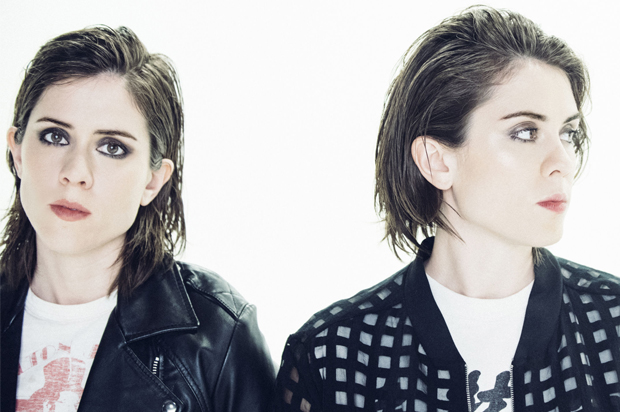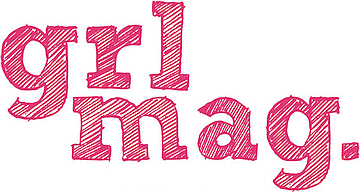

By, Hannah-Claire Brouse-Lillini
GRL MAG caught up with synth pop band, Tegan and Sara, who recently released a new album “Love You to Death”. Tegan and Sara are currently on tour in cities across the US and Canada. The two identical twin sisters are from Calgary, Canada, but travel back to Los Angeles quite often. Both musicians are songwriters, and multi-instrumentalist’s.
As we know, you guys are openly gay, how did you come out to your parents/close ones, and how old were you? And do think it would have been easier or harder to come out in today’s day in age?
I came out after Sara. She took much of the blowback from our mom when
she came out. I don’t know that I ever even worried about coming out so much as I just felt shy about it. I never hated myself for being gay. I found my attraction women comforting and exciting. We had a very pro gay friendly household. So I didn’t associate shame with it or fear. BUT, my mom was quite upset and hard on Sara when she first came out. Even as a ally to the community and an open minded alternative social worker she was worried for Sara, hurt that she had been kept in the dark about it for so long. But she came around. And I came out soon after that. Sara was 18. I think I was 19. I think things have changed a lot in the 15+ years since we came out for sure. But I think it’s still hard to come out for some people. I think it depends on where you live, how you grew up, if you are from a religious background. We had a fairly easy coming out because we were quite alternative and were not religious. But, we still hear a lot of sad, tough stories. I think things are improving with more visibility and representation of the LGBTQ community in the mainstream but we have a long way to go.
How does it feel to be such big role models for the queer community?
We take the role very seriously. Our intention over the nearly 20 years we’ve been making music is to be honest, open and proud of who we are and to emulate that through our music, our live performances and our interviews. It’s never struck as a choice to be hidden or to benefit by passing as straight. From our first shows we saw a huge LGBTQ presence and we recognized that we needed to fight for equality and visibility for our audience. Our hope was always to activate both the LGBTQ community but also our fans who we were allies. If we could help someone to come out, or feel good about themselves or inspire them to do something different with their lives because they saw us succeeding and being accepted we saw this as the highest form of achievement.
Which song on your new album took the most time to write and which album do you feel is the most personal, why?
I struggled writing That Girl. If I remember correctly I did multiple versions with different production styles before we settled on an arrangement. Then in the studio with Greg we continued to tweak it. It felt like pop but also dance and I wanted to ensure the hybrid felt accessible. I also wanted the message to be clear so I worked on the lyrics a lot. Sara helped write the bridge which eventually tied the song meaning together.
I think all our records are personal and emotional. But some stand out to me as more emotional and tragic than others. I love The Con. I was desperately lonely and emotional writing it. But I also remember back on that time fondly because I was living alone for only the second time in my life. I was writing night and day. I was sort of high on my misery. ha. So, I think fans attach to that record because the sadness is palatable.
On your latest album , the song ” Stop Desire” what is that about?
On the surface it’s a song about meeting someone and feeling an intense desire to take a leap with them. Maybe love at first sight? The game of getting someone to notice you. That kind of thing. Underneath this is more of a question of can you have it all? Desire and love? Can you stop one but have the other?
How did your parents react when they found out you wanted to become a band? Were they supportive?
Well we came out as queer and declared our interest to skip University to play music all in the same year. So, needless to say they were overwhelmed and a bit upset. But they came around quickly. We were very lucky and garnered a lot of attention quickly (luckily). Sara and I were able to get signed to a agent and a manager and a record deal all within the first two years of getting out of school and I think that showed our parents how serious we were. They got on board very quickly.
Were there things you wish you would have done differently when you started out as a band?
I kind of wish we had had a band name. Lol. I think that’s it. Otherwise…we just toiled and slugged it out on the road. We earned our career. Learned to craft songs. Learned to run a business. Fought to be here. And it was hard, but I wouldn’t change how we did it. It was how we built a career. And I think it was integral. Every shitty show, long drive, losing tour…every single thing got us here.
When writing songs, are both of your ideas different, or are they pretty similar? And if they are different, what are ways that you incorporate both of ideas to make one song?
I think there are always themes that tie together the different songs we both write. I think we are able to always find a cohesive vibe to pull together the different song ideas, experiences. I think as we are living a similar lifestyle, we are the same age, we were raised together, that we are definitely often sharing a vision and voice when it comes to song writing. I think it gives the project a cohesive feel but also it’s just slightly different enough that it makes it super unique.
Do you feel like people focus too much attention on your sexuality?
I go through phases. Definitely in our early career I felt it was a way to marginalize us. The focus felt limiting. I felt boxed in. I felt “niche”. The way people wrote about us or reviewed our music felt like a put down. Or felt like we were getting a pat on the head. It felt like they’re good…for girls…you’ll like them…if you’re gay type stuff. But, over the years the conversation has changed. I think the media is more well versed and prepared to talk about it. It feels less niche to be queer or a women in this industry. I don’t ever shy away from talking about it. We never have. But, I like the way its covered better now than I used to.
You must have heard the sad news surrounding Gord Downie from the Tragically Hip and seen all the support from their canadian fans, do you feel a special connection to Canada and your Canadian fans?
First off, yes it is so sad and tragic about Gord. He’s such a talent. So fierce and alive. The news came as a real shock. It was so magical to see the way the country rallied around the band and Gord. I think Canadians are so special and so supportive. It was very much what I imagine Canada to be. We are able to come together as a country (a giant and diverse country) when it matters. I think Canadians have a deep love and respect of each built into them. I feel very connected to our Canadian audience and a deep pride to have come from there.
Do you think that artists should have a message? Should that message be part of their music, or part of their life outside of the studio?
I don’t think artists have to have a message. Nor do I think their music needs to.
That being said I do think that using your platform for good, to speak out about social and political issues that matter, to activate and work for causes that are important to you etc – is important. And I like when bands have a voice and an opinion.
Do you think we still need programs that focus on girls, how is it that we haven’t moved past gender inequalities in music?
I do believe that we (women) still face so much sexism and misogyny on a daily basis that ensuring there is a focus on equality and visibility in the mainstream media, on television and in film, on radio, at school, in the workplace etc is incredibly important. Especially in music. Although women are exceptionally successful and represented in pop music, the rest of our industry skews very male, very straight and very white. I think diversity is still a huge problem in our industry. Not just for women. So, I do think having a focus on women is important. For instance we currently employ 9 women on our tour. Most are working in management or technical positions. I hope young women and men see that our sound and visual team is all women and feel inspired to follow that path. It is staggering how few women pursue technical positions in our industry. We need to change that.

Like!! Thank you for publishing this awesome article.